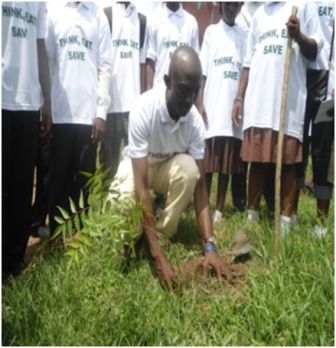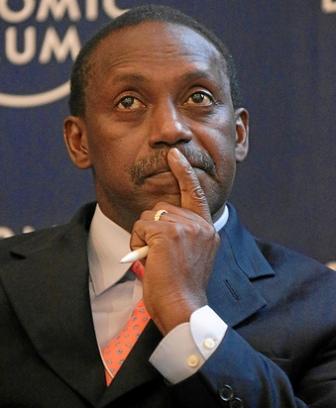The Energy Future We Want
Think about your life without electricity and other modern energy services: no light to read this by, no appliances, no refrigeration. No computers to link you to the outside world or transport to get you there. For nearly one of every five people in the world, that is everyday reality. (Photo: l-r Charles Holliday and Kandeh Yumkella)
This week, world leaders and thousands of business leaders, activists and citizens will gather in Rio de Janeiro to build a sustainable future – one that balances economic growth with social equity and protection of the planet’s resources. There are no shortage of urgent issues on the agenda at the UN Conference on Sustainable Development, or Rio+20: food security, protecting our forests, empowering women, improving health care or greening our cities. All are important in their own right and consistent with the conference slogan: “The Future We Want.”
But progress in each of these areas depends on a single factor: our ability to provide sustainable energy – energy that is accessible, cleaner, more efficient and affordable. Sustainable energy powers progress; it is the golden thread that weaves together all our Millennium Development Goals.
Schools, health clinics and businesses cannot operate without electricity. Women cannot improve their status if their days are spent gathering wood, collecting water, and cooking over fires whose smoke is destroying their health and that of their children.
In affluent areas, modern energy services are more accessible, but they are often not sustainable. Too much goes to waste in inefficient factories, buildings, and transport systems. The use of carbon-based fuels is contributing to a changing climate.
The Secretary-General of the United Nations, Ban Ki-moon, has called us to a different future – one in which the world commits, over the next two decades, to ensure universal access to modern energy services, double the global rate of improvement in energy efficiency, and double the use of renewable energy globally. These are ambitious objectives, but they are also achievable.
In response, leaders in government, business and civil society have come together in recent months to develop a Global Action Agenda and create new public-private partnerships on sustainable energy. Already we see the first fruits. Dozens of countries from Ghana to Nepal to Norway are now engaged. Grass roots training and advocacy efforts are expanding. New partnerships have been formed on transport, energy efficiency, solar cooking and finance. Many more will be announced in Rio.
All stakeholders have a role to play. We are asking governments to put in place the policy frameworks that will enable private investment to flourish. We are encouraging businesses to invest in new markets that expand energy access to those who need it most and offer innovative clean energy products and services. And we are calling on civil society to contribute their ideas, experience, and assistance.
This is the partnership model of the future, one in which the UN convenes all relevant actors to come to the table and work in common cause for the common good. The scale of global challenges – energy, food, water — demands nothing less.
Our Brazilian hosts at Rio+20 have shown what is possible with renewable energy, which supplied nearly 86% of the country’s electricity in 2010. Brazil’s example shows that transformative change can take place if there is the political will to act.
The profit motive also helps. Supplying energy to the billions who lack electricity and clean fuels is not just a moral imperative; it’s also a strategic business opportunity with trillion-dollar potential. Local entrepreneurs, investors and large companies can all help build a market that serves the huge pent-up demand for accessible, affordable modern energy that does not damage the environment.
Since the 1992 Rio Earth Summit, we have seen a communications revolution spread across the planet. Today, the world is connected by mobile phones and the internet. Who could have predicted this 20 years ago? This revolution was not achieved through development aid, but by governments adopting regulatory frameworks that enabled businesses to create markets.
This is also the model for sustainable energy: supportive policies from governments; resources for technical assistance and capacity building from donor agencies and financial institutions; private investment to enable good ideas to become commercial products; and community-based support to ensure that energy reaches the last mile. These steps will catalyze action from many sectors, including entrepreneurs large and small, to deliver the innovative energy products and services of tomorrow, today.
Energy is the critical underpinning of the global development agenda – connecting economic growth, greater social equity, and a healthier environment. At Rio, we encourage all stakeholders to make commitments that will provide a “down payment” toward transforming the world’s energy systems over the next twenty years. From this foundation, we will speed up and scale up our efforts to achieve a sustainable energy future that can provide greater prosperity for all and protect our planet for generations to come.
Charles Holliday is Chairman of the Board of Directors of Bank of America and former Chairman and CEO of DuPont Company. Kandeh Yumkella is Director-General of the United Nations Industrial Development Organisation (UNIDO) and Chair of UN-Energy. They are the co-chairs of the UN Secretary-General’s High-level Group on Sustainable Energy for All.
By Charles Holliday and Kandeh Yumkella
Stay with Sierra Express Media, for your trusted place in news!
© 2012, https:. All rights reserved.





